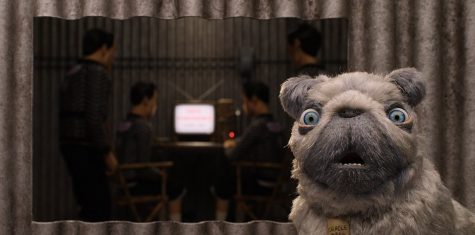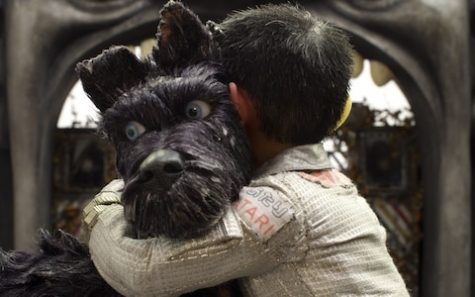Isle of Dogs: A Review of a Whimsical Treat
Poster image featuring most of the dogs and Atari Kobayashi
September 25, 2020
Wes Anderson is famous for directing the quirkiest films known to man. This is a bit of a bold statement, but when you look at The Royal Tenenbaums, The Life Aquatic with Steve Zissou, The Grand Budapest Hotel, or Moonrise Kingdom, you can see that his films set him apart from others. The humor is offbeat and incredibly strange in certain ways that seem like they wouldn’t work as a comedy but they just do. On top of that, every film he makes is incredibly stylish and it separates him from everyone else with his own original style. His films just look like a beautiful art painting that is stored inside of a tiny indoor tent (this isn’t me criticizing Wes Anderson films, he just happens to frequently include quirky tents). Recently, Anderson has been trying his hand at stop-motion animation. He first made Fantastic Mr. Fox, which somehow managed to translate his style in animation form. Now, as live-action filmmaking techniques have grown, so have stop motion techniques. It just so happened that he was all ready to jump back into the world of stop motion animation right when he had no problem translating his style into animation.
Isle of Dogs is set in Nagasaki Japan where an outbreak (this aged perfectly) of canine flu breaks out among the city. Hastily, a quarantine is ordered for every single dog in the area. Rather than shut away in their homes, hundreds of thousands of dogs are forced to live at Trash Island. After a while, Atari Kobayashi (Koyu Rankin), the nephew and ward of the mayor, hijacks a plane and flies over to the island to find his bodyguard-dog Spots (Liev Schreiber). He runs into a pack of five dogs named Chief (Bryan Cranston), Rex (Edward Norton), King (Bob Babalon), Duke (Jeff Gildblum), and Boss (Bill Murray), who take the boy in. Together they search through the island to find Spots all while the suspicious quarantine order is investigated by foreign exchange student Tracy Walker (Greta Gerwig).

I absolutely loved this movie, to say the least. Although I didn’t appreciate it enough when I was younger, I believe I’ve grown to love it with time. Out of the five films (Full Metal Jacket, The 40 Year Old Virgin, High Fidelity, Game Night and Isle of Dogs) my parents had me watch, I would have to say that this one is my favorite. Even though it came out two years ago, it feels like a fresh film I could watch several times. I found myself in constant awe of the skillful stop motion animation and completely satisfied with the creative methods the film used to portray character figures.
I could go on about the amazing stop motion animation, but I ultimately have to give props to director/writer Wes Anderson. Isle of Dogs is not only a visual treat but also a masterpiece of quirky dialogue. Every detail is agonized over, and each frame is completely artistic. Anderson is known for making his films quirky, but this film takes the cake. Anderson created a film that just makes you want to go up to your dog, or just any dog, and give them a big hug.

The movie also has a stellar cast. Each actor was perfect for the role she or he embodied. I found myself particularly drawn to the character Tracy, but this might be biased due to the fact that I love Greta Gerwig as a director. She was a fun aspect of the movie, and Gerwig really brought a lot of heart to the character. Bryan Cranston did a fantastic job portraying the many arcs that Chief faces, Edward Norton was funny as Rex, and Tilda Swinton (I forgot to mention) was oddly adorable as the little pug Oracle.

One controversy that surprised me was accusations that Isle of Dogs did not respect Japanese culture. I believe that is 100% false. While the film is mainly in English, all Japanese characters speak their native language, which is either translated by Interpreter Nelson (Frances McDormand) or the audience can easily assume the meaning. The culture is also respected greatly. It doesn’t feel whitewashed but it rather seems like a tribute to the lifestyle and outlook of Japan in general.
This film was a box office flop because it underperformed, but it deserves so much more praise. I say this not because the “dogs being quarantined” storyline is relevant to our lives now, but because the movie itself is lovely. Sure, it’s not a genre that most audiences are used to watching, but so many great names have come together to create a work that evidently has so much heart in it. Even my dog, who never pays attention to movies, seemed to enjoy it too.

















































































































































